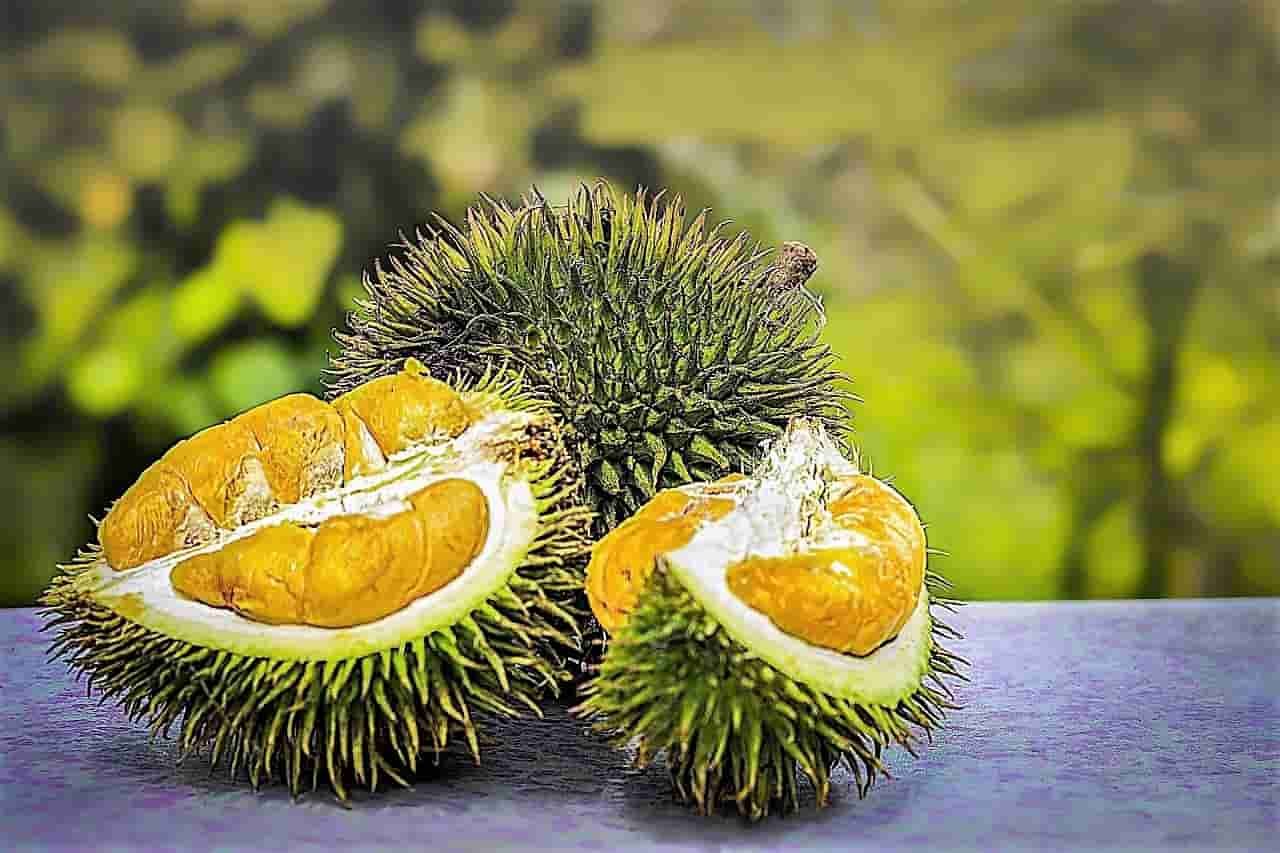Durian
Durian is a very surprising fruit on the taste and physical levels. Indeed, this fruit native to Asia is unlike any other. Its weight can reach 8 kg (17.6 lbs) and its flesh is covered with a shell covered with thick spines. Too ripe, the durian gives off a nauseating odor which has earned it a very bad reputation. Yet, nutrition-wise, durian has a few benefits to offer us.
Benefits of Durian
All parts of the durian plant – leaves, shells, roots and fruits – have been used in traditional Malaysian medicines to treat a variety of illnesses, including high fever, jaundice and skin conditions.
Studies have shown that Durian may have the following benefits:
• Reduces the risk of cancer. Its antioxidants can neutralize cancer-promoting free radicals. In one study, durian extract prevented the spread of a strain of breast cancer cells.
• Prevents heart disease. Several compounds in durian may help lower cholesterol levels and decrease the risk of atherosclerosis, or hardening of the arteries.
• Fights infections. The bark contains antibacterial and anti-yeast properties.
• Lowers blood sugar levels. Durian has a lower glycemic index than other tropical fruits, which means it can lower blood sugar. It can also prevent glucose uptake and stimulate insulin release
Although these studies are promising, many of them have been done on animals or in test tubes. The health benefits of durian need to be studied in humans.
Other benefits of this fruit
Very few studies have been done specifically on this fruit. The glycemic index of durian is 49 which is slightly lower than other tropical fruits like bananas (62). Like all other fruits, durian has bioactive compounds such as carotenoids, anthocyanins, polyphenols and flavonoids.
A good source of dietary fiber
Despite the lack of conclusive studies on this fruit, we can say that it contains dietary fiber in interesting quantities. In the body, fibers have many roles: they stimulate intestinal transit, promote digestive well-being, help fight against constipation and have a regulating effect on blood sugar and cholesterol levels. Finally, they have a satietogenic effect and allow better control of food intake.
Energy source
Durian is a source of carbohydrates, the preferred fuel for cells in the human body. Consuming durian therefore provides energy that is quickly available to the body. This fruit also contains vitamins that are involved in various metabolic reactions and support the immune system.
Richness in micronutrients
The potassium contained in the durian is a key element involved in the mechanisms of muscle contraction and nerve transmission. Magnesium, on the other hand, contributes to the normal functioning of muscles and nerves. It is closely related to calcium and potassium metabolism in the body. Finally, zinc is an important trace element that contributes to the support of immune defenses and helps to fight against the oxidation responsible for the premature aging of our cells.
Durian: danger and prohibition of this fruit with an unbearable smell
If Durio zibethinus (durian) is one of the edible fruit species, it is nonetheless harmless. Indeed, in Asian countries such as Thailand, Indonesia and Malaysia where this exotic fruit is found, there are several cases of overdoses due to excessive consumption of this fruit.
In addition, alcohol and durian do not mix because this strong-smelling fruit inhibits the production of the enzyme ALDH (aldehyde dehydrogenase) which protects the liver against the toxic effects of alcohol. It is also not recommended for people with high blood pressure to eat it. Anyway, do not abuse this food because it is high in sugar, very fat and very caloric (147 calories per 100 grams).
Information: Cleverly Smart is not a substitute for a doctor. Always consult a doctor to treat your health condition.
Sources: PinterPandai, HealthLine, Raffles Health, Smithsonian Magazine
Photo credit: Truthseeker08 / Pixabay



